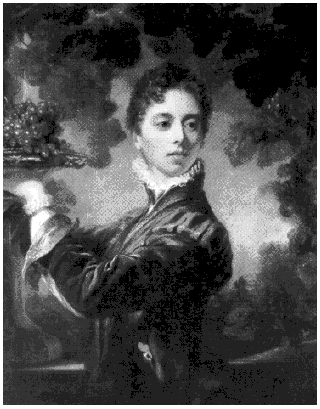Of Sisters
Annabella Milbanke and the
Destruction of the Byrons
David Crane
(Knopf)

Author Crane has, if we are to judge by this volume, pored over every screed, book, letter, poem, newspaper article, cartoon, and legal document in order to discover just what was going on, not so much with Byron and the two ladies, but the two ladies with each other. His thesis is that when --- on his wedding day --- Byron began the process of destroying his marriage to Annabelle, the two women were thrown together for mutual emotional support, a relationship that may have bordered on unrequited love.
His other major thesis is that Annabelle, who turned into (what Byron called) "The Princess of Parallelograms," was so turned upside down by her brief marriage to the poet that she spent the rest of her life trying to purge the "Byronic madness" that she experienced oh so briefly.
If you are filled with nostalgie de la boue, especially for peculiar ramblings and night-time sports of members of the English upper class from two centuries ago, The Kindness of Sisters will be your meat. There is endless documentation, letters between the three main characters, their friends, their public, and the lawyers. In fact, these three and their back-stabbing cohorts were so blabby with their written communication that we wonder that they had time do anything else --- like eat, sleep, and tend to their curious friends who, of course, wanted to know what the hell was going on.
Crane has served up a serious bit of scholarship, but The Kindness of Sisters suffers from a few shortcomings. The first is that the most interesting character is not the lead player --- just the background against which all these thrashings get acted out. We get, instead, Annabelle's doubtful reports of what the miscreant did to her on their honeymoon:
He called me to account for having so long withheld my consent to marry him, signifying I should suffer for it, and had better not have married him at all.
Later,
He turned to me with a bitter look & said "I wonder how much longer I shall be able to keep up the part I have been playing."
Later, when he was with both Annabelle and Augusta in the family estate at Newstead, Annabelle tells us that he shipped her off to bed as soon as possible so he could spend inordinate time with Augusta, known as "Goose" (he dubbed Annabelle "The Spider.")
Byron was a fascinating nut-case but, unfortunately, his two lady friends were no great shakes, either as writers or reporters on who did what to whom. Goose spent much of her time whimpering that she still loved him, no matter what (she also spent much time tending the seven children she had spawned, mostly by George Leigh).
Spider, on the other hand, grew more isolated, more and more martyred --- doted on by the people of England until Byron managed to win everyone's heart in typical Byronic twist by dying at Missolonghi while in the middle of fighting the cause of Greek Independence.
The most dubious section of The Kindness of Sisters is an extended play, a sixty-page fabricated dialogue between Annabelle and Augusta that presumably took place when they met for the last time in 1851. Some of us have an in-grown inability to follow the action and dialogue of dramatic productions in cold print, and this one is no exception. It is no more than a dollop of potted meat crammed in the middle of an otherwise mildly interesting exegesis. There are heaps of sighs and repressed tears, but it isn't something you'd go out of your way to see on Broadway.
 Crane is not without his stylistic virtues (referring, for instance, to Medora's husband's "emotional incontinence") but in general, it's rather dry up there in the scholarship department. Byron's life was certainly more interesting than that of Princess Di (comparison of their funeral cortèges included here) or Elvis Presley (whom some idiots have compared him to) --- but to know Byron, forget these gossips and take a weekend with Don Juan. It was, is, and always will be one of the great paradoxical, riotous narrative poems in the English language, far more brilliant than the stuff dredged up by his peers Wordsworth (Byron called him "Wordswords") or Coleridge ("I wish he would explain his explanation.")
Crane is not without his stylistic virtues (referring, for instance, to Medora's husband's "emotional incontinence") but in general, it's rather dry up there in the scholarship department. Byron's life was certainly more interesting than that of Princess Di (comparison of their funeral cortèges included here) or Elvis Presley (whom some idiots have compared him to) --- but to know Byron, forget these gossips and take a weekend with Don Juan. It was, is, and always will be one of the great paradoxical, riotous narrative poems in the English language, far more brilliant than the stuff dredged up by his peers Wordsworth (Byron called him "Wordswords") or Coleridge ("I wish he would explain his explanation.")
If we have to come up with a similar tragic figure, Byron is probably more closely akin to Oscar Wilde. Both were great writers. Both were the toast of English society. Both did something to offend the poltroons; and both were sucked into a legal nightmare of their own creation.
Both, ultimately, got the hell out of England: Wilde to France and destroyed by his excesses; Byron, in the Mediterranean, coming into his own, creating his best written poetry along with the poetry of a stunning life, filled with Byronic twists and turns.
None of it would have come about, according to Crane, if he had stayed home fiddling with the Goose while the Spider hung about, trying to nab them in coitus reservatus.